A Report from Kurdish Syria
Journalist Goes Inside a Little Known Revolution
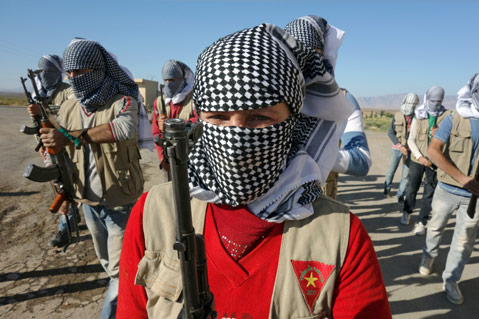
Photos by Kevin McKiernan
All changed, changed utterly:
A terrible beauty is born.
—W.B. Yeats, “Easter, 1916”
I was sitting on the dirt floor of a hut on the Tigris River in northwestern Iraq, just outside the booming territory established by Iraqi Kurds 21 years ago in 1991, a place that today looks increasingly like an independent Kurdish state. I was negotiating with smugglers to get across the border into Syria, where the civil war against the dictator Bashar al-Assad was raging. I wanted to get what I considered the important but under-reported story of Syrian Kurds, who recently had taken up arms in the hope of establishing their own autonomous region.
When I started covering the Kurdish struggle 21 years ago, the dream of a unified homeland was still shared by many of the 35 million Kurds who spill over the frontiers of Iraq, Syria, Turkey, and Iran. Today, Iraqi Kurds worry that overt support for Kurds outside Iraqi Kurdistan will jeopardize their own hard-won independence. Western reporters are barred from crossing the Dicle, as the storied Tigris is known locally, because Iraqi Kurdish leaders fear that publicizing the Kurdish autonomy movement in Syria will anger Turkey, their primary trading partner. Turkey has been unable to contain its own Kurdish rebellion, an armed uprising led by the Kurdistan Workers’ Party, the PKK. The conflict has dragged on for 28 years, and both sides have been guilty of human rights violations. With Kurds in Syria now supporting the PKK agenda for a Greater Kurdistan, with rebel attacks inside Turkey now intensifying, and with an Arab opposition that includes jihadists finally closing in on the Assad regime in Damascus, the whole region was teetering toward implosion. Once again, the age-old struggle of the Kurds was front and center.
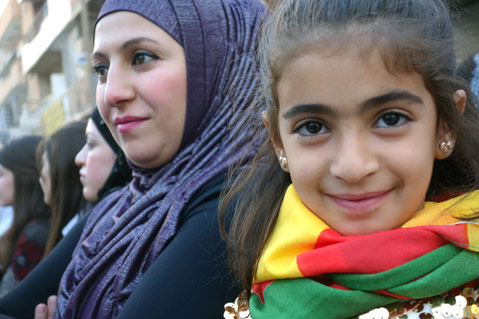
GETTING TO KNOW THE KURDS: IRAQ
My introduction to the Kurds came in 1991, near the end of the first Gulf War, when a Swiss journalist and I hiked across the Taurus Mountains from Turkey into Iraq. We arrived just as the victorious Allies were designating northern Iraq as a no-fly zone. Kurds in Iraq were still reeling from the Anfal, Saddam Hussein’s genocidal campaign of the 1980s, which razed 4,000 villages and killed 200,000 people, including 5,000 victims in a notorious chemical attack on the town of Halabja.
Iraq’s invasion of Kuwait had set off a chain of events that would hurt — then eventually help — the Kurds. A massive, U.S.-led air and ground assault forced Saddam’s troops to withdraw from Kuwait, but then, in an unexpected development, the U.S. decided against removing the dictator from power in Baghdad. Instead, President George H. W. Bush exhorted Iraqi civilians to rise up on their own. Expecting U.S. aid, the Shiites rose up in the south and the Kurds in the north. But when the administration allowed Saddam to use his Soviet-supplied gunships against his own people, both uprisings were savagely crushed. One and one-half million Kurds fled to Turkey and Iran. According to some reports, 2,000 Kurdish refugees were dying every day along the roads.
Iraqi Kurdistan was awash in pestilence. Typhoid, cholera, and bronchitis were spreading unabated: Coughing, spitting adults sat on the roadsides in filthy clothes, next to crying kids. Flies clung to the scraps of dirty food on dirty plates. Walking through the freezing mud at the Sayed Sadeq refugee camp, I photographed Kurdish children in plastic sandals. A refugee asked me what on earth I was going to do with all the pictures. “We want bread,” she asked. “Why picture, picture, picture?” The question itself seemed to form a picture. For a moment at least, it seemed that the camera had changed hands.
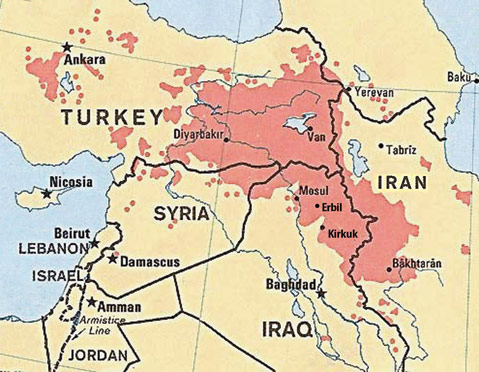
In the effort to cripple Saddam, the Allies had bombed the sewage treatment, water sanitation facilities, and food distribution routes throughout Iraq. The water was polluted, and people were dying. At almost every turn, you encountered starving children, barking dogs, and the wretched stench of burning rubbish. The government in Baghdad was regrouping, but the war in Kurdistan wasn’t over. It dragged on and on, like a long day at the end of the world. Life looked like a scene from the Mad Max film The Road Warrior.
Along a mountain road, I watched a father bury his baby daughter, her tiny body wrapped in a woven Kurdish blanket. As he lowered the child into the rocky grave, he held himself erect, his face without expression. I was an awkward visitor at a foreign funeral, but he embraced me afterward, thanking me in Kurdish and Arabic for “honoring” his loss. I could feel his body tremble.
Everywhere you went in those days, you saw burials, bombed-out buildings, downed electrical and telephone wires, looted homes, and the carcasses of animals. Armed bands of Kurdish rebels, the peshmerga (“those who face death”), roamed the countryside on no apparent mission. Cannibalized vehicles blocked the roads, with bullet holes through the windows, stripped of tires, engine parts, whatever could be carried off. With the exception of an occasional discarded Iraqi army helmet, there were few signs of Saddam’s troops, who by then were retreating south.
Despite all the suffering, the no-fly zone imposed by the West offered the Kurds of Iraq their first taste of autonomy. With American and Allied warplanes patrolling the skies north of the 36th parallel, they began administering public affairs, establishing their own parliament, wearing traditional clothes, singing their own songs, and opening Kurdish language schools — all of which had been previously forbidden by the Baghdad government. To their envious cousins in the restive Kurdish areas of Turkey, Iran, and Syria, this part of Iraq — which we reporters referred to as an “enclave” or “rump state” — had become “South Kurdistan.”
Sunni Versus Shia and the Proxy War in Syria
• Alawite Muslims: Predominantly Shia. Alawites make up about 14 percent of the population in Syria. The ruling elites are mostly Alawite, including the dictator, Bashar al-Assad. Shia Iran and (mostly) Shia Lebanon back Assad.
• Sunni Muslims: About three-quarters of the Syrian population are Sunni. The anti-Assad opposition is almost entirely Sunni. The opposition is backed by the Sunni leaders of Turkey, Qatar, and Saudi Arabia.
• Kurds: Largely Sunni Muslims. They have tried to stay neutral in a civil war that in less than two years has taken about 40,000 lives.
• Other players: The U.S. and Israel; China, with growing markets in the Middle East; and Russia with its only military base, outside the former Soviet Union, in Syria.
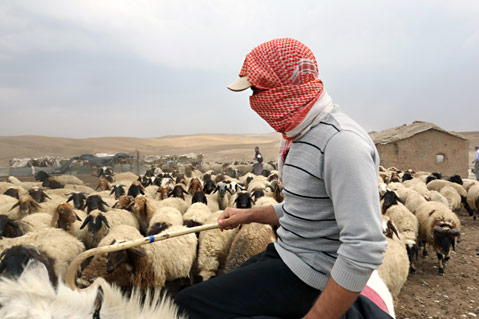
2012: A Golden Era for the Kurds
Returning to Iraqi Kurdistan after so much time, I was unprepared for the change. The sky-high real estate prices, Western-style fast food joints, $5 mochas, iPhones, MacBook Pros, flat-screen TVs showing Saving Private Ryan in Kurdish, and fancy malls with escalators — conveyances I’d never seen in Kurdistan — and skyscrapers, where recruited workers from Bangladesh and Nepal were polishing faux marble in the lobbies — well, it was all a shock to me.
In the washroom of the upscale Abu Shabab restaurant in Erbil, the Kurdish capital, a dark-skinned, dour-looking Punjabi was handing out paper towels. I had never seen a “human towel dispenser” in Kurdistan, and I stopped to chat. The man said he worked 30 or 31 days straight — depending on the month — and received an extra 25,000 dinars, about $20, for coming in on Friday, the Muslim holiday. He told me he sent home the bulk of his salary, about $450 a month.
I had to admit that the Iraqi Kurds had come a long way since the dark days of 1991, back when they had “no friends but the mountains.” Still, I was taken aback by the specter of hundreds of thousands of sub-wage workers immigrating from poor Asian countries, only to become part of a new caste system. According to my friend Shalaw Askeri, there is more work than workers because Kurds have become too picky to accept jobs like street cleaning. Was this, I wondered, the “Kuwait-ization” of Kurdistan?
When I was here to cover the war in 2003, Erbil had only four hotels, providing spartan accommodations that deserved — in the words of one Kurdish builder — a “zero-star rating.” When I ran into the same builder this time, he’d just completed construction of the luxury Tangram Hotel in Erbil, near the Kurdish Parliament. He told me that 20 new five-star hotels, including two Hiltons, a Sheraton, and a Kempinski, were also under construction.
The Iraqi Kurds’ share of revenue from the central government in Baghdad is 17 percent, about $17 billion annually. But the Kurds make as much as $2 billion — “magic money” as some call it — from oil deals they signed independently with multinationals such as Chevron and Exxon. Chevron, which is based in San Ramon, California, announced in July that it will buy oil rights to explore 490 square miles of countryside north of Erbil. Baghdad has denounced such agreements as “illegal and illegitimate” and has warned the oil giants they will be barred from doing business in the rest of the country, but to little effect.
Despite the U.S. narrative that postwar Iraq is a success story, the country is now partitioned in all but name. In central and southern Iraq, hundreds of people are killed annually in sectarian bombings, but there hasn’t been a bombing in Iraqi Kurdistan for several years. Israel, which has befriended the Kurds as a counterweight to Arab influence in the Middle East, is said to be training and equipping peshmerga forces. Security, like per capita income, is the highest in the country. Here, the Kurds have their own parliament and ministries; their tricolor flag, which first appeared during the Kurdish independence movement in the Ottoman Empire, flies overhead. Tourism is booming. Arab businessmen and vacationers flock here from throughout Iraq, but the Iraqi army is not allowed to enter the Kurdish autonomous region. The Ministry of Education dropped Arabic from the school curriculum in 1991, which means that most people no longer speak the majority language.
The tractors and hay wagons I used to see on the roads are mostly gone. Now it is rare for a family not to own at least one automobile. There is so much traffic that Kurdish police have started enforcing seat-belt laws and fining speeders. The most popular car is the Nissan Sunny, which sells for just over $10,000, putting it within reach of an emerging middle class.
Wealthier Kurds these days prefer the Lexus LX570, although some still drive the broad-fendered Toyota Land Cruiser. That’s the SUV that the Kurds, back in the days of Bill Clinton’s troubles in the White House, nicknamed the “Monica.” Of course, there is also the Chrysler 300 Hemi, the high-performance sedan with smoked windows, thought to be a favorite of American rappers. The Kurds refer to it as the “Obama.”
Kurdistan is still a cash economy, without banks or credit cards. At the sparkling Jaguar–Range Rover showroom next to the Palace Hotel in the city of Sulaimania, the salesman told me most people keep their cash — and a gun or two — at home. One customer arrived with $180,000 — in a plastic bag. The dealership has money-counting machines, but it still took a while to total the sale.
Reportedly, there are now 2,000 millionaires and six billionaires in Iraqi Kurdistan, a territory of five million people that is less than half the size of California. When I was here in the ’90s, the two legendary families, the Barzani clan and the Talabani clan, were fighting a bitter civil war. Today, they still control the two major parties, the KDP (Kurdistan Democratic Party) and the PUK (Patriotic Union of Kurdistan). Both families have extensive real estate and business holdings, and both have been accused of corruption.
But despite this increasingly comfortable lifestyle, most ordinary Kurds still cling to the dream of a unified Kurdistan. Many say they support the separatist efforts of the PKK rebels — as long as Iraqi Kurdistan is not threatened in the process — and regard its leader, Abdullah Öcalan, long imprisoned by the Turkish government, as a hero. But Iraqi Kurdish leaders may not share such sentiments. Last year, the Kurdish President of Iraq, Jalal Talabani, a former guerrilla fighter against Saddam who was once based in Syria, caused an uproar when he ruled out uniting the Kurds of Iraq, Syria, Turkey, and Iran within a single Kurdish state. In an interview with a Turkish newspaper, the 79-year old Talabani dismissed the notion of a Greater Kurdistan as “just a dream in poems.”
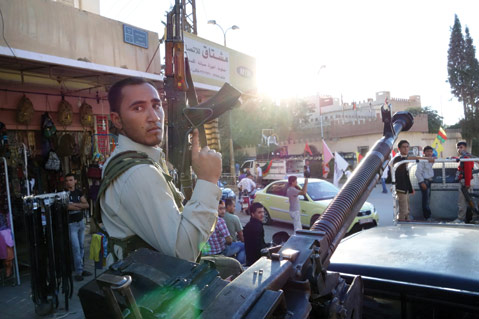
A Diary from Kurdish Syria
Too long a sacrifice
Can make a stone of the heart.
—W.B. Yeats, “Easter, 1916”
October 14, 2012
After two days of waiting on the Iraqi banks of the Tigris, my fixer, a mustachioed man with gray hair and a 9 mm pistol tucked in his waistband, found a shepherd with a small boat, paid the bakshis, and I was able to make it across the Tigris. This would not be my first time in Syria without papers. In 1996 I had backpacked into Iraq with a hundred armed PKK rebels who were en route to Turkey. We had left the petrol-rich Kurdish region in Syria at night, in the eerie glow of oil fires, and crossed the river at dawn in rubber rafts.
In those days, the PKK funneled fighters to the Turkish battlefield through Lebanon and into Syria, where Hafez al-Assad, the father of the current dictator, had long provided a safe haven for rebel leader Abdullah Öcalan. In 1995, for a 60 Minutes interview conducted in a Damascus safe house, I met an ebullient, cocky Öcalan. Just two years later, the fortunes of the PKK leader changed abruptly when Turkey demanded that Assad shut down the PKK. The Turks backed up their ultimatum by deploying 50,000 soldiers along the Syrian border. Assad expelled Öcalan, who then embarked on a multi-country odyssey. With the secret help of the Clinton administration, he was captured in Kenya in 1999. He has been imprisoned ever since on a Turkish island near Istanbul, part of the time in solitary confinement.
The Kurds have had a painful history in Syria. After WWI and the breakup of the Ottoman Empire, French colonists recruited Kurds as a foil to Arab nationalism, giving the educated minority privileges that included a special military unit. The practice left a bitter legacy. In 1959, Kurdish officers were purged from the Syrian army. In 1962, Syria stripped most Kurds of citizenship, forbidding them to own property or hold government jobs. In the mid 1960s, after the hyper-nationalist Ba’ath party came to power, oppression of the Kurds intensified. Soon, Syrian Kurds were forced to carry special red identity cards. After the Assad regime came to power in 1971 following a coup d’état, the persecution of the Kurds began to ease. Turkish Kurds fleeing during the violence in their own country were allowed to resettle in Syria. But Syrian Kurds remained noncitizens.
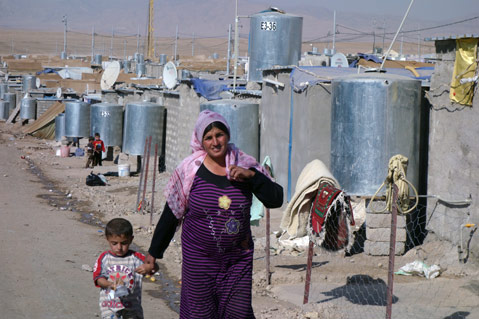
When I landed in Syria this time, I engaged a fixer named Hassan, a 26-year-old geology graduate of the respected University of Damascus. He told me he was trying to scrape together a dowry to marry his sweetheart of four years, but with the revolution going on, there weren’t any jobs for geologists. Instead, he hires himself out to the few foreign journalists who manage to find their way to the dusty town of Derik, with its 70,000 mostly unemployed residents. In oil-rich Syrian Kurdistan, where most of the country’s 2.5 billion barrels of crude still lies untapped in the ground, the streets are broken and littered with trash, the few cars in sight are old and beat up, and no one has a flush toilet.
It turned out that I was Hassan’s only customer, and because Derik doesn’t have a hotel, he took me to the home of another partisan, a threadbare apartment where six adults and three kids shared four rooms. He parked my backpack against a wall, under framed photos of a family member, a young man killed last year in the Kurdish uprising in Turkey. Hassan and his friends spoke in Kermangi, the Kurdish dialect in Syria. He explained to me, in broken English, that the young man went to Turkey to fight because at that time the Kurdish revolution in Syria was not “ripe.”
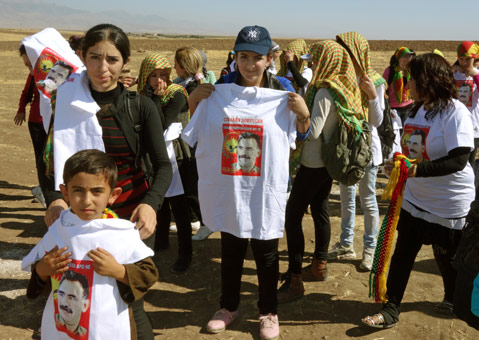
Hassan believes the Kurds will be the only winners in Syria’s bloody civil war. That is because they have declared autonomy without open warfare with the regime, and because the Arab militias who make up the opposition are splintered and eventually will turn on each other. When that happens, he believes, control of the Kurdish region will go to his people. Hassan, it struck me, was an optimist.
So far Syrian Kurds have managed to stay neutral in a civil war that has taken 40,000 lives in less than two years. At the moment, there’s an uneasy calm between Assad’s police forces and the Kurdish militias called the People’s Protection Units (YPG), which are composed of secular Sunni Kurds. When police in the nearby town of Qamishli recently rounded up seven Kurdish teenagers for Assad’s dwindling army, the YPG kidnapped 15 cops and soldiers. Shortly thereafter, the unwilling conscripts were exchanged for the government hostages.
That was followed by a similar incident in Derik, and the pattern has repeated itself, sometimes ending in tit-for-tat killings. Hassan said the game has limits. The regime’s forces are stretched thin, and the YPG militias are only lightly armed. Neither the police nor the Kurds can afford an all-out war.
The all-out war in Syria is the one being fought by Free Syrian Army (FSA), a patchwork of some 18 splinter groups, including devout Sunnis like the Muslim Brotherhood and, ominously, a growing number of Al Qaeda fighters. The FSA claims the Kurds collaborate with the regime; whenever anti-Assad fighters try to enter the Kurdish zone, Kurdish fighters try to drive them out. Just last month, when the FSA tried to raise its flag in the mostly Kurdish town of Ras al-Ain, dozens of Arabs and Kurds died in the fighting. After the regime falls, the two sides will either reach an accommodation regarding Kurdish autonomy or will go to war.
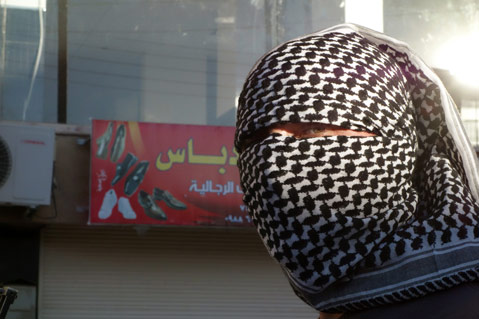
October 16, 2012
I was sitting in the back of a taxi with smoked windows, taking pictures of the Derik police station, the mukhabarat, through the windshield. I could see a cop behind bulletproof glass, near the large pictures of Bashar al-Assad and his late father, Hafez, that adorn the castle-like fortress. Adem, the driver, had just finished telling me about his arrest in 2004 for participating in a Kurdish protest. He spent four months in the notorious Palestine prison in Damascus, where he endured electric shocks and falaka, the foot torture British colonial police are credited with introducing to the Middle East in the 1930s.
As we drove around town, I got a better sense of the tenuous cat-and-mouse system that seems to coexist here. The Kurds control two of the five roads into town, enabling them to move fighters and contraband. But the Syrian government still pays teachers and hospital workers, and it allows the utilities and phone system to operate. The military checkpoint on the next block remains, at least for the time being.
For his part, Hassan says the Kurds should not make the mistake they did after WWI, in Ottoman times, when they joined the Turks to oust the Sultan — only to find that their ethnic identity was under siege once the fight was over. And they shouldn’t make the mistake they did in Iraq in 2003 in the aftermath of the invasion, when the U.S. convinced the Kurds to back the central government in Baghdad in exchange for the promise — still unfulfilled — of a referendum to be held by 2007 to determine who would control oil-rich Kirkuk, a city the Kurds consider their “Jerusalem.” For the Kurds, it’s not enough to be against Assad. Who or what replaces the dictatorship in the Syrian Arab Republic, Hassan said with emphasis, could be just as bad. “We want to save our nation,” Hassan said.
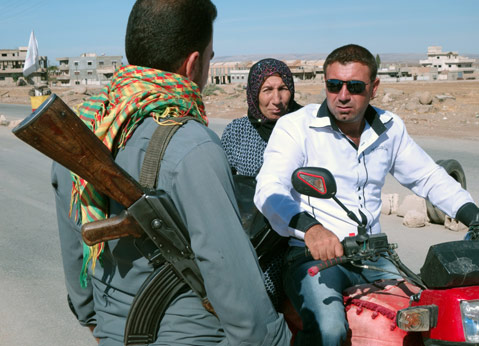
October 21, 2012
Today, the Democratic Union Party (PYD), the dominant Kurdish party in Syria, opened a new office in President’s Square, just a hundred yards from the mukhabarat. Once outlawed and operating in the shadows, the PYD now has attracted about 700 Kurdish activists. Young and old, they speak Kurdish, play Kurdish music, and wear traditional Kurdish clothing. Many carry Kurdish flags and photos of Abdullah Öcalan. All of this would have landed them in jail — or worse — just a short time ago. We did meet some teenage girls who told us the regime had closed the local school briefly for holding Kurdish language classes, but the school reopened after two days — and the language classes resumed.
Across town at the Kurdish cultural center, singers were practicing for a concert. The walls of the auditorium were covered with large photographs of Derik residents who had been killed in the Kurdish uprising in Turkey. I spoke with one of the musicians about the upcoming presidential election in the U.S. He was playing the saza tembûra, a popular Kurdish instrument that resembles a long-neck mandolin. Like so many Kurds I met on this trip, he told me he preferred Republicans to Democrats. He hoped Mitt Romney would be president “so Assad can be bombed.”
The next day we traveled 20 miles to a cemetery in the parched countryside, where a youth group was hosting a memorial for shahids, or “martyrs,” the Kurdish word for fallen fighters. Organizers handed out new T-shirts with the image of “Apo,” as Öcalan is widely known. Someone fitted an oversize shirt on an 8-year-old boy, who stood stiffly at attention. My driver introduced me to his sister, who was filming the event for a Denmark-based Kurdish TV station.
Back in town, Hassan received a call from his grandfather, who told him the mukhabarat had phoned, wanting to know the whereabouts of Hassan and “that journalist.” Apparently, we were spotted taking pictures outside the police station. His grandfather, who was born when Syria was still a French colony, told the caller his grandson didn’t live there any more. Hassan said it was time to move me to a different apartment.
Hassan believes the police in Derik know who he is. He has never been arrested, but he knows there are ajahns (spies) in town, so he has to be careful. He warned me about the secret agents who lurk undercover on the streets, and he emphasized their hostility toward sahafi (journalists). He displayed all the bravado of a young revolutionary: “If I am arrested, one thousand angry demonstrators will surround the mukhabarat.” he said. Noticing my skepticism, he got a twinkle in his eye. “If you get arrested,” he added, “no one will show up!”
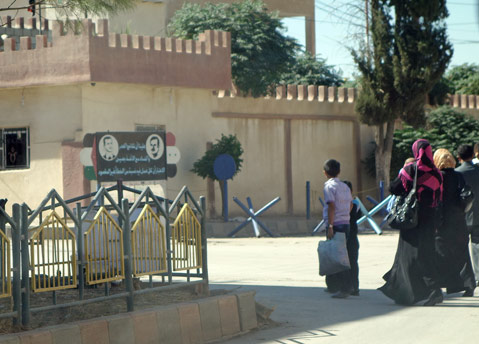
October 23, 2012
I got word that I’d be allowed to photograph the People’s Protection Unit (YPG) militia at a training camp some 30 miles from Derik, within sight of both the Turkish and Iraqi borders. The commander, whose nom de guerre is Ahmed, told me the base was secret and that these will be the first photos the YPG has permitted. Until now, the rebels have kept a low profile, not wanting to antagonize the nearby Turkish army. He asked me not to take pictures of the building.
It seemed to me that even even if Turkey did not make good on a recent threat to “stamp out the PKK in Syria,” local Kurds will have a tough time keeping their “powder dry.” They seemed more likely to fight Assad’s Arab opposition, than to join it. They don’t want to be part of something else. They are not looking for integration.
That afternoon we visited the Dadgeh, the Kurdish court, a parallel system of justice in the 300-mile strip of northern Syria that locals now call “West Kurdistan.” It is one of three branches of the new government under an umbrella Syrian Kurds have named Tev-Dem or the Movement for Democratic Communities. The other two branches are the Parliament, which is still being implemented, and the Executive. The Executive is responsible for language, training, culture, labor, youth, and women’s groups. The Democratic Union Party and its armed militia, the YPG, are under the Executive.
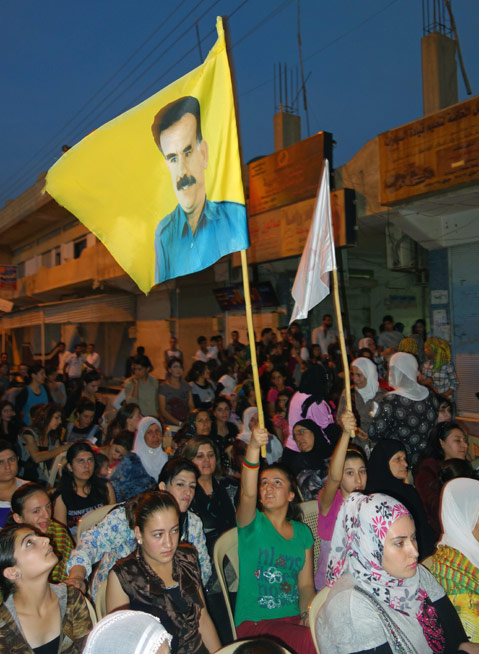
Massoud Suleiman, one of the lawyers in the Dadgeh, told me that the 11-member court, which includes four women and a Christian, were chosen in a public election. Three judges are on duty each day, and the full panel assembles once a week. One of the judges, Abdul Raouf Haji, said they are volunteers, “But we hope to get paid in the future.” Under the new system, the Kurdish police have three days to file charges against a subject, or he must be released. Haji says the court has already ruled in several cases and currently has a murder suspect locked up in Derik.
By the end of my trip, Free Syrian Army rebels were closing in on Damascus, and there were growing fears that a desperate regime would resort to using its stockpile of chemical weapons. But in northern Syria along the borders of Turkey and Iraq, Kurds were taking their first halting steps toward autonomy. Some of it seemed familiar, a déjà vu moment from the early ’90s in Kurdish Iraq, the place some Kurds like to call “South Kurdistan.” For good or bad, that genie was out of the bottle in Syria. There seemed to be no turning back.



